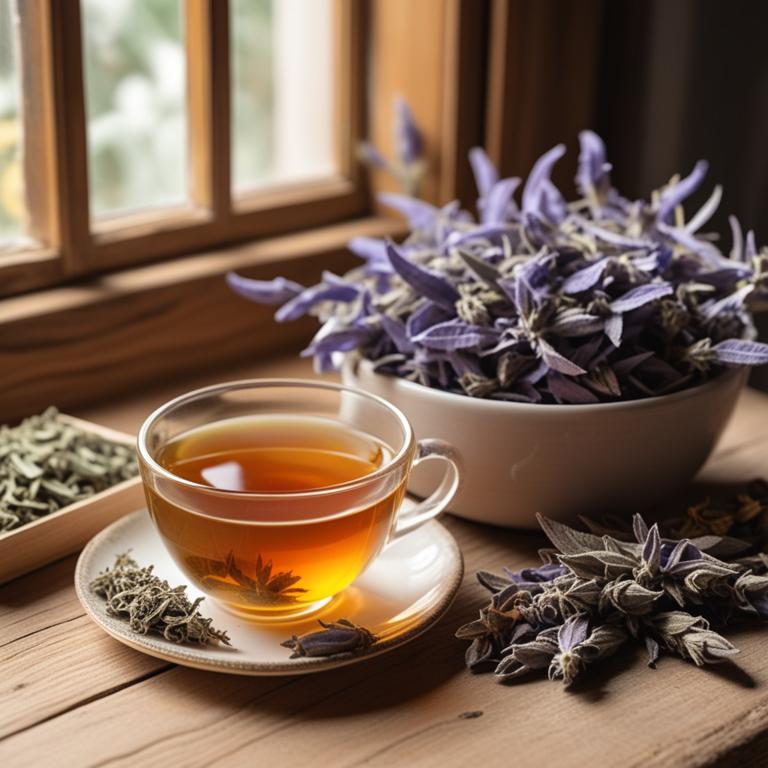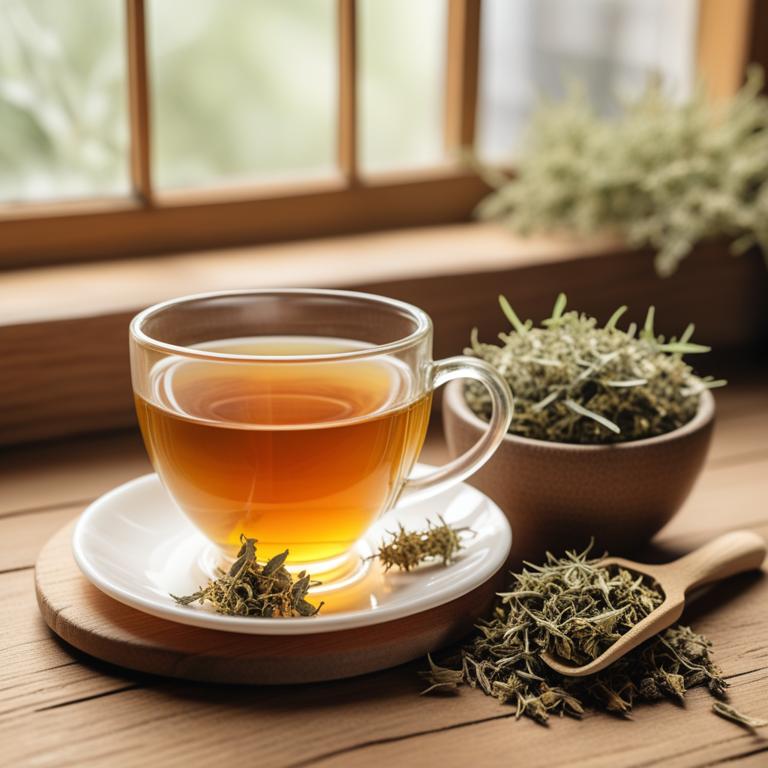9 Herbal Teas For Blocked Nose

Herbal teas can be a great way to help relieve a blocked nose.
When you drink an herbal tea, the steam from the hot liquid helps to loosen and clear out the mucus that's blocking your nasal passages. This makes it easier to breathe. Some herbs are particularly good at helping with this. Eucalyptus globulus, for example, is a natural decongestant. It works by opening up the tiny airways in your nose, allowing more air to flow through.
Thymus vulgaris, also known as thyme, has a similar effect. It's also antibacterial, which can help to prevent infections. Echinacea purpurea is another herb that's often used to help with respiratory issues. It's thought to boost your immune system, which can help your body fight off infections more effectively. Drinking an herbal tea made with one or more of these herbs can help you feel more comfortable when you have a blocked nose.
You can breathe more easily, and you may be able to reduce the amount of medication you need to take.
- 1. Eucalyptus globulus
- 2. Thymus vulgaris
- 3. Echinacea purpurea
- 4. Zingiber officinale
- 5. Rosmarinus officinalis
- 6. Sambucus nigra
- 7. Lavandula angustifolia
- 8. Hyssopus officinalis
- 9. Salvia officinalis
1. Eucalyptus globulus

Eucalyptus globulus teas contains a compound called eucalyptol, which is responsible for its decongestant properties.
Eucalyptol works by loosening and thinning mucus in the airways, making it easier to expel, and relieving congestion in the nose. The tea also contains flavonoids, such as kaempferol and quercetin, which have anti-inflammatory properties that help reduce swelling in the nasal passages. When inhaled, the eucalyptol in Eucalyptus globulus teas helps open up airways, making it easier to breathe.
This makes it a popular remedy for people with a blocked nose.
- Gather 1 cup of boiling water and 1 tablespoon of dried Eucalyptus globulus leaves.
- Measure 1 cup of boiling water and pour it into a heat-resistant cup.
- Add 1 tablespoon of dried Eucalyptus globulus leaves to the cup.
- Let it steep for 5-7 minutes to release the oils and flavors.
- Strain the leaves and drink the tea while it's still warm to help relieve a blocked nose.
2. Thymus vulgaris

Thymus vulgaris teas contains compounds like thymol and carvacrol, which have decongestant properties.
These properties help to break down mucus and reduce swelling in the nasal passages, making it easier to breathe. Thymol, in particular, has antimicrobial properties that can help to combat infections that may be causing the blockage. Carvacrol has anti-inflammatory properties that can help to reduce inflammation and ease congestion.
By drinking Thymus vulgaris teas, you can help to clear your airways and relieve a blocked nose.
- Boil 1 cup of water in a kettle.
- Add 5-7 sprigs of fresh Thymus vulgaris leaves to a teapot.
- Pour the boiling water over the Thymus vulgaris leaves in the teapot.
- Let it steep for 5-7 minutes, then strain the tea into a cup.
- Drink the tea when it's warm, 2-3 times a day to help relieve a blocked nose.
3. Echinacea purpurea

Echinacea purpurea teas contains compounds like alkylamides, caffeic acid derivatives, and polysaccharides.
These bioactive constituents have anti-inflammatory and immune-boosting properties. The caffeic acid derivatives help to reduce inflammation in the nasal passages, making it easier to breathe. The polysaccharides stimulate the production of mucus, which can help to trap and remove allergens and irritants that cause congestion.
By reducing inflammation and promoting mucus production, Echinacea purpurea teas may provide relief from blocked noses.
- Gather 1 cup of fresh or dried Echinacea purpurea flowers, stems, and leaves.
- Combine 1 cup of Echinacea purpurea with 1 cup of boiling water in a saucepan.
- Let the mixture steep for 5-7 minutes, then strain it into a cup.
- Add 1 tablespoon of honey to the tea, if desired, and stir well.
- Drink the Echinacea purpurea tea 2-3 times a day to help relieve a blocked nose.
4. Zingiber officinale

Zingiber officinale teas contains a compound called gingerol, which has anti-inflammatory properties.
These properties help reduce swelling in the nasal passages, making it easier to breathe through a blocked nose. Gingerol also acts as a natural expectorant, thinning mucus and helping to clear it out of the airways. The volatile oils in ginger, such as zingiberene and bisabolol, have a decongestant effect, further relieving congestion.
By reducing inflammation and thinning mucus, Zingiber officinale teas can help alleviate blocked nose symptoms.
- Gather 1 tablespoon of dried Zingiber officinale (ginger) root and 1 cup of boiling water.
- Place the ginger in a cup or teapot.
- Pour the boiling water over the ginger.
- Let it steep for 5-7 minutes. Strain the tea if you want it without ginger pieces.
- Drink the tea, 2-3 times a day, to help relieve a blocked nose.
Zingiber Officinale Tea on Amazon
FGO Organic Ginger Tea, 100 Count, Eco-Conscious Tea Bags, Caffeine Free, Packaging May Vary (Pack of 1)
Disclaimer: We earn a commission if you click this link and make a purchase at no additional cost to you.
5. Rosmarinus officinalis

Rosmarinus officinalis teas contains rosmarinic acid, a powerful antioxidant that helps to reduce inflammation in the nasal passages.
This acid has anti-inflammatory and antihistamine properties that can help to alleviate congestion and clear up a blocked nose. The tea also contains camphor, which has a decongestant effect, helping to loosen and clear mucus from the nasal passages. The anti-inflammatory properties of rosmarinic acid and the decongestant properties of camphor work together to help open up airways and relieve a blocked nose.
By consuming Rosmarinus officinalis teas, the body is able to use these compounds to help alleviate nasal congestion and promote easier breathing.
- Gather 1 cup of water and 2 tablespoons of fresh Rosmarinus officinalis leaves.
- Heat the water in a pot until it starts boiling.
- Add the fresh Rosmarinus officinalis leaves to the boiling water.
- Let the mixture steep for 5-7 minutes, then strain it.
- Drink the tea warm, 2-3 times a day to help with a blocked nose.
6. Sambucus nigra

Sambucus nigra teas contains bioactive constituents such as flavonoids, anthocyanins, and phenolic acids.
These compounds have anti-inflammatory and antioxidant properties, which can help to reduce swelling in the nasal passages and promote healing. The flavonoids in Sambucus nigra teas, specifically quercetin and kaempferol, have been shown to have decongestant properties, which can help to relieve congestion and open up airways. The anthocyanins in Sambucus nigra teas have been found to have antihistamine-like effects, which can help to reduce the production of histamine in the body and alleviate symptoms of hay fever and allergies.
By consuming Sambucus nigra teas, individuals with blocked noses may experience relief from congestion and sinus pressure due to its decongestant and anti-inflammatory properties.
- Gather 1 cup of water and 1 tablespoon of dried Sambucus nigra flowers or 2-3 fresh flowers.
- Heat the water in a pot and bring it to a boil.
- Add the Sambucus nigra flowers to the boiling water and reduce heat to low.
- Steep for 5-7 minutes, then strain the liquid into a cup.
- Drink the tea 2-3 times a day to help relieve a blocked nose.
7. Lavandula angustifolia

Lavandula angustifolia teas contains the bioactive constituents linalool and linalyl acetate, which are known for their decongestant properties.
These compounds work by reducing inflammation and congestion in the nasal passages, helping to ease breathing and relieve stuffiness. Linalool also has a natural expectorant effect, making it easier to expel mucus and other irritants from the body. The antiseptic and antibacterial properties of linalyl acetate help to prevent the growth of bacteria and other pathogens in the nasal passages, further reducing congestion.
By addressing the underlying causes of a blocked nose, Lavandula angustifolia teas can help to provide quick and effective relief from nasal congestion.
- Gather 1 cup of dried Lavandula angustifolia flowers.
- Add 1 tablespoon of the flowers to a tea infuser or a heat-resistant cup.
- Boil 1 cup of water and pour it over the flowers.
- Let the mixture steep for 5-7 minutes, then strain it.
- Drink the tea warm or at room temperature, up to 3 times a day.
8. Hyssopus officinalis

Hyssopus officinalis teas contains essential oils like camphor, bornyl acetate, and linalool.
These compounds have decongestant properties that help break down excess mucus and reduce congestion in the nasal passages. The camphor in Hyssopus officinalis teas acts as a bronchodilator, widening airways and making it easier to breathe. Bornyl acetate has anti-inflammatory properties, which help reduce swelling in the nasal passages and sinuses, further relieving congestion.
By using Hyssopus officinalis teas, the decongestant and anti-inflammatory properties of its essential oils can help alleviate blocked nose symptoms.
- Gather 2 tablespoons of dried Hyssopus officinalis leaves.
- Boil 1 cup of water in a kettle or pot.
- Add the dried Hyssopus officinalis leaves to the boiling water.
- Reduce heat and let it simmer for 5-7 minutes.
- Strain the tea and drink it while it's still warm.
9. Salvia officinalis

Salvia officinalis teas contains rosmarinic acid, a powerful antioxidant that helps to break down mucus and reduce inflammation in the nasal passages.
This natural decongestant also contains camphor and borneol, compounds that thin mucus and make it easier to expel. The expectorant properties of Salvia officinalis teas help to loosen and clear out excess mucus, making it an effective remedy for a blocked nose. Additionally, the tea's anti-inflammatory properties help to soothe and calm the nasal tissues, reducing swelling and promoting healthy drainage.
By drinking Salvia officinalis teas, you can help to clear out congestion and breathe easier, naturally.
- Gather 1 cup of fresh or dried Salvia officinalis leaves.
- Use 1 tablespoon of Salvia officinalis leaves for every 1 cup of boiling water.
- Steep the leaves in boiling water for 5-7 minutes.
- Strain the liquid and discard the leaves.
- Drink the tea warm or at room temperature, 2-3 times a day.